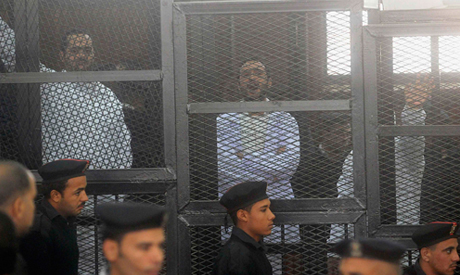
Political activists Ahmed Maher (R), Ahmed Douma (C) and Mohamed Adel, founder of 6 April movement, look on from behind bars in Abdeen court in Cairo, December 22, 2013 (Photo: Reuters)
The National Council for Human Rights has criticised the conditions of jailed activists Ahmed Maher, Mohamed Adel, Ahmed Douma and Alaa Abdel-Fatah, following a visit by a council delegation to the prison where the men are being held.
The delegation visiting Tora prison in south Cairo included human rights laywers Ragia Omran and Nasser Amin.
Abdel-Fattah and Maher were arrested in November, and the other two men in December. Adel, Douma and Maher were convicted in December of organising illegal protests, under the provisions of a new law that was passed in November, and sentenced to three years in jail. Their appeal is due to take place on 20 January.
Abdel-Fattah was convicted last week of charges of torching the campaign headquarters of politician Ahmed Shafiq in 2012, and given a one-year suspended sentence.
He faces further charges of organising illegal protests.
The four men, all prominent liberal and leftist activists, have not been allowed to meet with their lawyers since they were arrested, according to a statement released by the council on Sunday. Some of them were also barred from calling or meeting their family members, “in spite of it being allowed by the prison's bylaws.”
Strict restrictions are also imposed on their mail, read the statement.
“The defendants are present inside their cells during weekends and national holidays, and sometimes they stay inside their cell for over two days, which renders them unable to perform Friday afternoon prayers,” added the statement, which said that time allotted for exercise had also been reduced, leaving the activists inside their solitary cells for over 20 hours per day.
The statement further criticised the general prosecution for not responding to the three-week-long hunger strike by the detained activists, which led to the deterioration of Douma’s health.
The jailed activists started the strike in protest at what they described as bad treatment by their jailers.
The statement called on the prosecutor-general to issue the necessary permits to allow the detainees' lawyers and families to visit them.
The detention of activists violating the protest law, which requires all public demonstrations to have police permission, has fuelled fears of an expanding crackdown on opposition by the country's interim authorities, beyond a sustained campaign against Islamists since the ouster of Mohamed Morsi on 3 July.
Short link: